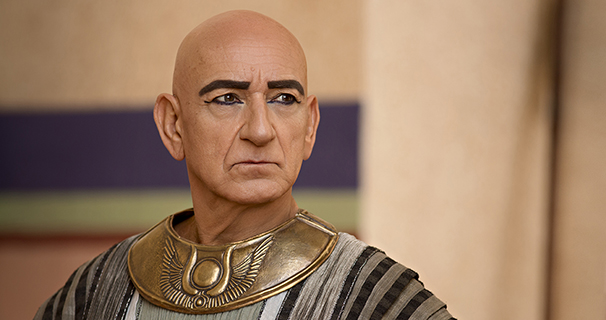Tut star Sir Ben Kingsley: 'I'm dead normal, really'

The latest updates, reviews and unmissable series to watch and more!
You are now subscribed
Your newsletter sign-up was successful
Want to add more newsletters?

ONCE A WEEK
What to Watch
Get all the latest TV news and movie reviews, streaming recommendations and exclusive interviews sent directly to your inbox each week in a newsletter put together by our experts just for you.

ONCE A WEEK
What to Watch Soapbox
Sign up to our new soap newsletter to get all the latest news, spoilers and gossip from the biggest US soaps sent straight to your inbox… so you never miss a moment of the drama!
Over six hours this weekend, Channel 5 is screening Tut, the story of the legendary young Egyptian king Tutanhamun. Oscar-winning English actor Sir Ben Kingsley plays Ay, Tut's mentor. He talks about the series and his career...
How much did you know about ancient Egypt before you took on the role in Channel 5’s Tut?
“I remember going to the British museum as a schoolboy and seeing a mummified body. I was part-horrified, part-thrilled by this ancient creature."
You’re a very versatile actor, starring in sci-fis, biopics and even The Jungle Book. How do you prepare for your roles?
“I look for the archetype with which I can label my character."
What’s my dramatic function in terms of serving the story?
“In Tut, it is to represent pure, unswerving ambition, so I think about how that can be translated into Ay’s behavior with every single person he comes face to face with.”
The latest updates, reviews and unmissable series to watch and more!
Tut is a rites-of passage tale in which the title character grows into his responsibilities, and the role of mentor is one of many masks worn by Ay. So who mentored you as you made your way in the world?
“My first mentor was an extraordinary female director working with me in theatre in education. She said: ‘One day you are going to be a great classical actor.’ And I didn’t believe her.”
Why did you decide to tread the boards?
“My motives for being a storyteller are pure, and I found a way to be me. Now I’m being me when I’m being an actor – it’s a paradox, but it’s true.”
Tell us about Gandhi, the role that catapulted you into the public eye and for which you won an Oscar. How do you feel about that role?
“[Director Richard] Attenborough opened the door for my film career, and I love and thank him for that.
“It was one of my greatest challenges – how I hate that word! He knew I had never walked onto a film set as a leading man, but I did have years of Shakespeare behind me, and that has been my most profound influence.
“Shakespeare mapped out parts of human behaviour that are undeniably true and pure – he almost invented the human being. To go from Shakespeare to Attenborough, literally in one month, that synergy was just perfect.”
Is there one performance which has given you particular satisfaction?
“I have been embraced by many Holocaust survivors who have thanked me for telling their story [in Schindler's List]. And I have been the recipient of extraordinary awards, but I’m not very good at looking back.
“However I do remember when we filmed one of many ghastly scenes in Schindler’s List, dear Steven [Spielberg] turned to me with his eyes glittering and said: ‘That’s in my movie.’ In other words, he was saying: ‘Argue with that – it’s undeniable.’”
How do you feel about the incredible people you’ve worked with along the way?
“I feel I’ve been guided from one angel to another in terms of life’s journey. Healers, storytellers, remarkable people. They have left echoes – what I call voices in my head and my heart – and I still hear them.”
How do you manage life in the public eye?
“I do remain private, and my boundaries are fairly strong. I’m not on Facebook or Twitter, and I avoid anything and everything written about me – with respect to those that are writing it.
“I spend my time reading scripts, or in the garden at home in Oxfordshire thinking about scripts, or cooking for my wife. I’m dead normal, really.”

